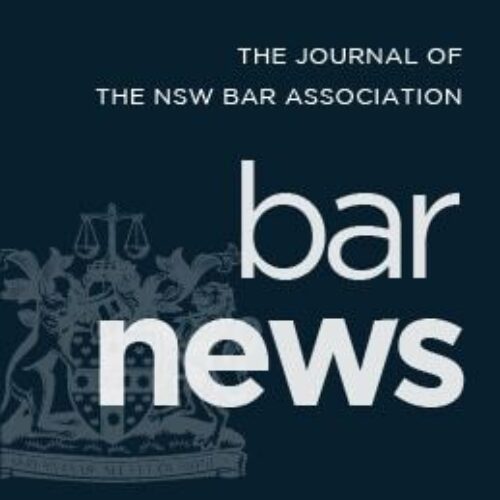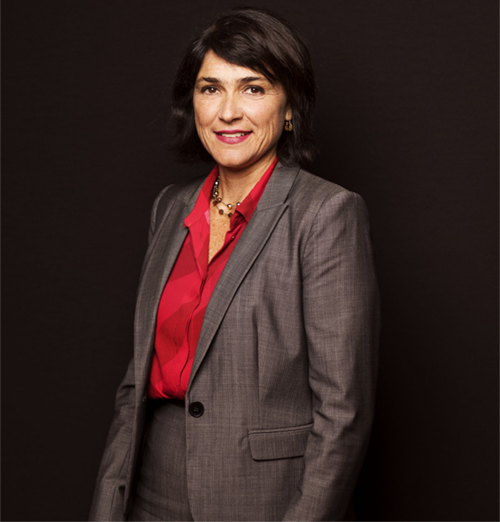- Summer 2023
- Interview with Australian Sex Discrimination Commissioner Dr Anna Cody

Bar News (BN): Congratulations on your appointment as the Australian Sex Discrimination Commissioner! Your appointment follows an extraordinarily distinguished career in human rights and discrimination law, including as Dean of the School of Law and Professor at Western Sydney University, Director of Kingsford Legal Centre, Chair of both Community Legal Centres Australia and CLCNSW, Director of the NSW Legal Aid Commission Board, and attaining a PhD in Law from UNSW and a Masters in Human Rights Law from Harvard University, among other notable achievements. What is it that drew you to human rights and discrimination law throughout your career?
Dr Anna Cody (AC): It’s the recognition of our common humanity, what we share as humans and what makes us different. It’s also a strong sense of justice and injustice. I like people. I care deeply about individuals being able to contribute and have the same opportunities. Human rights and its international focus lends itself to tackling injustice. The law itself is a powerful tool in addressing how resources are allocated within a society and provides the opportunity to make life fairer for everyone.
BN: You have worked in human rights law and international development in Mexico, East Timor and Indonesia, New York, Alice Springs and El Salvador. What are the highlights of these experiences?
AC: Each of the communities and regions I have worked in has influenced me and how I see the world. In El Salvador, for instance, the wealth inequality is extreme, exacerbated by the civil war between 1979 and 1992. An oligarchy, known as the Fourteen Families (‘las catorce familias’) which controlled most of the country’s land and wealth, also operated in the country for much of the 19th and 20th centuries. Women and girls in particular were impacted by a deeply unfair allocation of money and resources.
There was an absence of knowledge of legal rights in the lives of women and girls. It was powerful to see my team raising awareness of legal concepts and making the legal system accessible, enabling action against injustice.
BN: On 12 September 2023, you featured in an article that appeared in the Editor’s Picks of the Sydney Morning Herald about the likely scope of your role.1 How important is it that discrimination matters are kept front of mind and dealt with as prominent and mainstream by the media?
AC: Matters of discrimination should absolutely be front of mind because discrimination affects all of us all of the time. Discrimination diminishes us all. It means that we as a community don’t get the full benefit of each individual if some are prevented from participating in the workplace or the highest echelons of leadership.

BN: In the SMH article, you spoke about the multi-faceted, cross-sectional nature of discrimination, the need for addressing equality issues holistically, and for having regard to the experiences of those who are First Nations, from culturally and racially diverse backgrounds, from LGBTQI backgrounds, with or without disability and those from marginalised socio-economic backgrounds. What are the benefits to the Australian community of a more holistic approach to addressing inequality?
AC: The benefit is that all members of the community will be able to participate in society. The contribution of everyone improves the quality of life for all. It’s not just for the benefit of those who are currently excluded. The ways in which people experience disadvantage are complex. None of us are just one identity. We come with the richness of experiences, whether we are First Nations, whether through cultural or racial identity, whether we have disability. So if we create a society in which everyone can participate, we get the value and benefit of those important contributions.
On 19 September 2023, Monash University published a study demonstrating the lack of women from First Nations and culturally diverse backgrounds in leadership roles.2 Diversity of perspectives and experiences is vital to drive innovation, economic growth and social progress. The study, which included an interview with Senator the Hon Penny Wong, offered systemic solutions that recognise and act on the wide range of factors that can lead to disadvantage.
BN: This year you will launch a workplace reform program titled ‘Positive Duty’, calling upon business to take a preventative approach to sex-based harassment and discrimination under the duty imposed by Part IIA of the Sex Discrimination Act 1984 (Cth) (SD Act), effective as of December 2022. What will this entail?
AC: The Australian Human Rights Commission (AHRC) will be rolling out an intensive education process, which started with guidelines issued in August 2023.3 These contain seven standards (requiring showing leadership, developing a positive culture, modelling and rewarding positive behaviour, educating and having risk management and reporting strategies in place) to equip businesses to comply with the positive duty.
BN: On 12 December 2023 the enforcement provisions of the SD Act take effect, giving the AHRC the power to commence an inquiry when it ‘reasonably suspects’ that an employer or PCBU is not complying with the positive duty, after which the AHRC may, inter alia, issue compliance notices and apply to the FCA or FCAFCOA for orders (Div 4A, Pt II, Australian Human Rights Commission Act 1986 (Cth)). The revised EM says that this suspicion might come from government agencies or regulators, impacted individuals, unions or the media ([165]). On 19 September 2023 you said that the AHRC is ‘resourcing up’ in preparation for the new enforcement powers.4 What do you envisage?
AC: The AHRC has been actively skilling up and resourcing so that it has a substantial section ready to use the new enforcement powers in December.
The AHRC will have a similar regulatory framework and powers to the Fair Work Ombudsman and work health and safety regulators. We absolutely envisage using the power to issue compliance notices, and approach the court for orders, and we will aim to work with employers and ‘persons conducting a business or undertaking’ (PCBUs) to achieve compliance.
The positive duty removes the onus on individual complainants from having to make complaints and places an onus on employers and PCBUs to take reasonable and proportionate measures to eliminate discriminatory conduct. Barristers and barristers’ chambers are PCBUs and are subject to the positive duty.
BN: In the article on 19 September 2023, you also said that there are professions you are keen to see lead the way, including the legal profession.5 Do you have suggestions on how the legal profession can do that?
AC: We know that the legal profession has had particular issues with harassment, discrimination and bullying. As upholders of the law we have a responsibility to ensure that our profession is at the forefront of making positive change and helping create a fair society.
A great example of making positive change is the guide launched on 12 September 2023 by the Law Society of NSW, aimed at tackling persistent gender pay gaps.6 Two consecutive years of profession wide studies revealed pay inequality exists across the entire career cycle of solicitors.
For the Bar, as with many workplaces, the challenge is how to achieve equality of outcomes for women barristers, culturally and racially marginalised barristers, those with disability and First Nations barristers. Achieving pay equity is one aspect, recognising the complexities of this at the Bar. Enhancing representation in senior leadership is another. Providing bystander training is yet another. I understand these matters have been and remain a priority for the Bar Association and the Bar’s governing body, Bar Council, and that initiatives dedicated to supporting and improving inclusivity and diversity are a focus.
BN: On 19 September 2023, in another article,7 the AHRC innovatively suggested that employers offer financial incentives to reward respectful behaviour in tandem with pay-based penalties in connection with harassing or discriminatory conduct. Can that positively address all forms of discrimination, harassment and bullying?
AC: A way of creating desired culture is rewarding positive behaviour and calling out negative behaviour. This fosters a culture that is safe, respectful, inclusive and that values diversity and equality. As was said in the article, individuals could become ineligible for rewards or promotion if they have been found to have engaged in substantiated acts of relevant unlawful conduct.
In the legal profession, a wide range of activities can be (and are often already) taken into account in assessing the creation of safe and respectful workplace cultures, including contributions to the community in the form of pro bono work, mentoring, volunteering, committee involvement, for instance.
BN: As Director of the Kingsford Legal Centre, you wrote about working with First Nations woman Joy Williams, who was deeply harmed by being removed from her mother as a baby and placed in Bomaderry Children’s Home8 under the practice later to be examined in ‘The Stolen Generation’ report, in a matter that was ultimately heard in 2000 by the Court of Appeal.9 You say in that article that was the beginning of your commitment to law reform, and it showed you the importance of the compassionate side of the law and systemic advocacy to address injustice. Is that equally as important today and do you have observations that could assist barristers who are interested in similar paths?
AC: Law reform is important because the way in which our laws and legal system function can always be improved. One of the great ethical duties we have as lawyers is to contribute to the administration of justice, which I define broadly to include assisting the achievement of just outcomes and ensuring that people can turn to the legal profession for outcomes that reflect community standards. The NSW Bar, through Bar Council as well as Committees, are active in law reform.
In this way the Bar can influence systemic change. Individual barristers can also have a positive influence, even for instance in the way they decide to run a case or cross examine a witness. It needs to be clear and assertive but never needs to be aggressive, demeaning or humiliating. Barristers could also ask themselves whether they are reinforcing negative stereotypes.
BN: On 6 April 2023, the governing body of the NSW Bar, Bar Council, voted unanimously to support the First Nations Voice to Parliament.10 What benefits do you see in the implementation of the Voice to Parliament and in supporting the ‘Yes’ campaign?
AC: First Nations peoples need to be advising parliament about the best ways of dealing with matters affecting First Nations people. Again, the community has better outcomes with an enhanced policy understanding of the particular needs of various groups. It is tied to the benefits of a holistic idea of identity and with principles of self-determination, equality and dignity, which are fundamentals of our human rights system.
The Voice to Parliament is significant and I will be voting yes. BN
ENDNOTES
1 Chrysanthos, ‘New sex discrimination commissioner urges wider lens to tackle inequality’, Sydney Morning Herald, 12 September 2023.
2 https://www.monash.edu/news/articles/women-fromdiverse- backgrounds-still-face-leadership-barriers-study.
3 AHRC, ‘Guidelines for Complying with the Positive Duty under the Sex Discrimination Act 1984 (Cth)’, August 2023.
4 Wootton, ‘Sex Discrimination Commissioner puts mining, legal, retail on notice,’ Australian Financial Review, 19 September 2023.
5 Wootton, ‘Sex Discrimination Commissioner puts mining, legal, retail on notice,’ Australian Financial Review, 19 September 2023.
6 https://lsj.com.au/articles/law-society-of-nswlaunches- new-guidance-to-address-gender-pay-gap/.
7 James Manning, ‘Workplace sexual harassers could be stripped of bonuses, pay rises,’ Sydney Morning Herald, 19 September 2023.
8 Dr Anna Cody, ‘The case that changed me: Anna Cody’, Law Society Journal, 1 October 2018.
9 Williams v The Minister Aboriginal Land Rights Act 1983 and New South Wales [2000] NSWCA 255.
10 Bashir SC, ‘It’s time to close the gap, in the Constitution’, Sydney Morning Herald, 13 April 2023.
